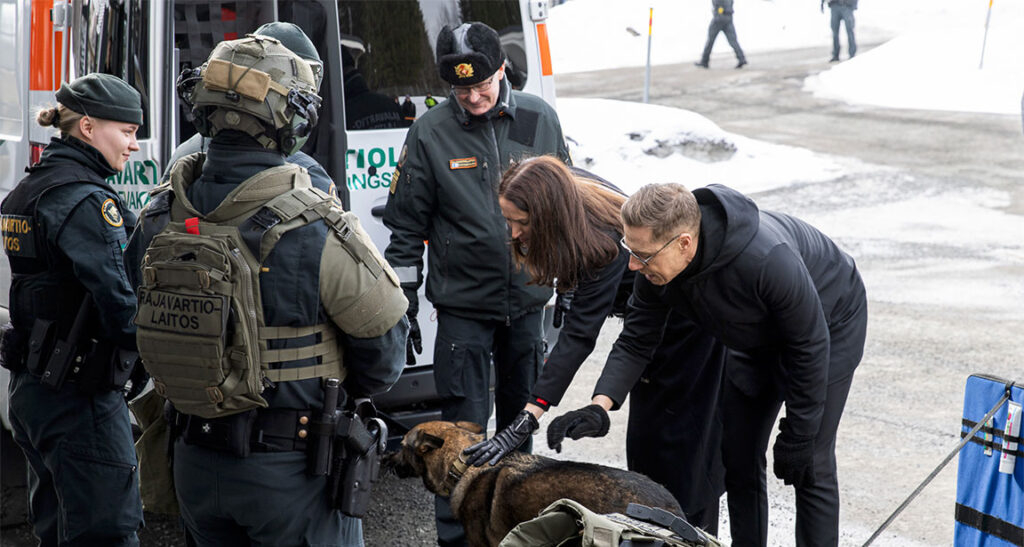Finland President Alexander Stubb visits the border checkpoint of Niirala on March 27, 2024. Stubb said his country needs to guard against Russian attempts to undermine national security through “hybrid operations” along the 800-mile border between Russia and the Nordic nation. X VIA GOVERNMENT OF FINLAND
THE WATCH STAFF
Newly elected Finland President Alexander Stubb visited his country’s border with Russia on March 27, 2024, as the government discusses measures to give Finns more tools to deter “hybrid influence” operations by its eastern neighbor. A little more than a week later, the government announced an indefinite extension of the border closures that have been in effect since fall 2023.
Stubb met with Finnish Border Guard representatives at the Niirala checkpoint in the North Karelia region, which is sparsely populated and suffered partition after Russian aggression in World War II. Border Guard Capt. Mikko Sorasalmi demonstrated equipment used by border patrols. Also present were EU border agency officials, according to the Barents Observer, a Norwegian newspaper.
In less tense times, the Niirala border crossing was the eastern terminus of the “Blue Highway,” which connected Sweden to Russia. The border has been closed for much of the past six months after the Finnish government said hundreds of migrants, mostly young men from the Middle East and Africa, had been sent to the border by Russia in buses. Finnish authorities have said Russia is undertaking a “hybrid operation” to undermine their country’s national security.
The government completed a draft law earlier in March 2024 to prevent asylum seekers from entering the country. The acceptance of asylum requests would be significantly limited under the law, the Barents Observer reported. The government said the bill balances national security concerns with human rights considerations. “We have to weigh up national security, border security, international agreements and human rights,” said Prime Minister Petteri Orpo, according to the Barents Observer. The new legislation requires 166 votes in the 200-member Parliament. “We have to prepare for the fact that the situation may get more difficult when spring arrives,” Orpo said in March 2024. “The authorities need tools to manage the terrain border.”
Finland joined NATO shortly after the Russian invasion of Ukraine in February 2022, prompting Russian President Vladimir Putin to threaten retaliation. The traditionally non-aligned nation of 5.56 million has uneasily coexisted with Russia, which invaded Finland in 1939, resulting in a three-month war known as the “Winter War” in which Russia seized nearly 10% of Finland’s territory in the 1940 Moscow Peace Treaty. Since then, the Finns have maintained a robust military with fervent support and citizen participation, which NATO sees as a strong deterrent to Russian aggression in Scandinavia.
Finnish residents in the border region enthusiastically greeted Stubb in his first visit to the region since being elected in March 2024. Stubb, 56, has also served as prime minister and foreign minister during his political career. Stubb said he supports the border act because asylum no longer works in an international situation where the neighboring country is using migration in hostile ways. “You always have to live with the times. By this I mean, in principle, that if a country such as Russia uses people as a weapon, there must be a range of means to stop it,” Stubb said during his visit to North Karelia, according to the Finnish public broadcaster Yle.
Stubb said he had been in close contact with the government before the bill was circulated for comments. “The primary goal for all of us must be Finland and Finland’s security. The authorities must have the tools to operate in difficult places, and this is what we are looking for.”
On April 5, 2024, the Finnish government announced an extension of the border closure. Unlike previous closures, in effect for delineated periods, the announcement gave no date when the border would be reopened. “We have not seen anything this spring that would lead us to conclude that the situation has changed meaningfully. In addition, spring will provide opportunities to put more pressure on Finland. There are hundreds and possibly thousands of people close to Finland’s border on the Russian side that could be instrumentalised against Finland,” said Interior Minister Mari Rantanen in a statement, according to Yle.

